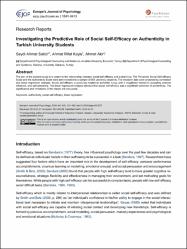| dc.contributor.author | Satıcı, Ahmet Seydi | |
| dc.contributor.author | Kayış, Ahmet Rıfat | |
| dc.contributor.author | Akın, Ahmet | |
| dc.date.accessioned | 2019-10-19T19:56:27Z | |
| dc.date.available | 2019-10-19T19:56:27Z | |
| dc.date.issued | 2013 | |
| dc.identifier.issn | 1841-0413 | |
| dc.identifier.uri | https://dx.doi.org/10.5964/ejop.v9i3.579 | |
| dc.identifier.uri | https://hdl.handle.net/11421/14943 | |
| dc.description.abstract | The aim of the present study is to examine the relationship between social self-efficacy and authenticity. The Perceived Social Self-efficacy Scale and the Authenticity Scale were administrated to a sample of 308 university students. The research data were analysed by correlation and linear regression analysis. Social self-efficacy is positively related to authentic living, and is negatively related to accepting external influence, and self-alienating. The linear regression analysis showed that social self-efficacy was a significant predictor of authenticity. The significance and limitations of the results are discussed. | en_US |
| dc.language.iso | eng | en_US |
| dc.relation.isversionof | 10.5964/ejop.v9i3.579 | en_US |
| dc.rights | info:eu-repo/semantics/openAccess | en_US |
| dc.subject | Authenticity | en_US |
| dc.subject | Linear Regression | en_US |
| dc.subject | Social Self-Efficacy | en_US |
| dc.title | Investigating the predictive role of social self-efficacy on authenticity in Turkish university students | en_US |
| dc.type | article | en_US |
| dc.relation.journal | Europe's Journal of Psychology | en_US |
| dc.contributor.department | Anadolu Üniversitesi, Eğitim Fakültesi, Eğitim Bilimleri Bölümü | en_US |
| dc.identifier.volume | 9 | en_US |
| dc.identifier.issue | 3 | en_US |
| dc.identifier.startpage | 572 | en_US |
| dc.identifier.endpage | 580 | en_US |
| dc.relation.publicationcategory | Makale - Uluslararası Hakemli Dergi - Kurum Öğretim Elemanı | en_US] |
| dc.contributor.institutionauthor | Satıcı, Ahmet Seydi | |


















